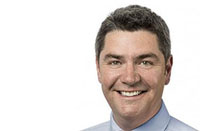28 February 2023

Tony Clarkson is the Principal Clinical Advisor at the Victorian Responsible Gambling Foundation, a former PACFA Board member and will be a keynote speaker at the Australia & New Zealand Addiction Conference, 26-28 April, 2023.
Can you share how you came to be involved with the Victorian Responsible Gambling Foundation/working with people affected by gambling harm?
After arriving in Australia in 2013, I started looking for work and began my professional career here as a therapist in a gambling treatment service. I moved into the clinical manager role soon after and the service is was funded by the Foundation. A role came up there after a couple of years — heading up the professional development function — and I've always been interested in the system, rather than just working on the frontline. That was what appealed to me about it and has done ever since.
What will be the focus of your keynote talk at the Australia & New Zealand Addiction Conference?
I'll talk about how gambling treatment services need to be better integrated into other mental health, AOD and family and relationship services, the work we're doing and the possible outcomes for people who use those services.
In your clinical work as a Registered Clinical Psychotherapist, are there modalities/strategies/attitudes you have found to be particularly effective in working with people struggling with gambling (and/or people misusing alcohol and other drugs)?
I've found that people experiencing addiction issues have often experienced some form of trauma at points in their lives. This is often manifested through addictive behaviours and the addiction can act as a palliative for the trauma.
Dr Gabor Maté is also a keynote speaker at the conference, and has spoken about misuse of alcohol and other drugs as a rational ‘self-medicating’ response to trauma. Is this a relatively recent framework, or just more widely publicised recently?
I think it's a well-known approach to addiction. I think the issue is we've had quite a myopic view of addiction generally — it's either the American-dominated medical model which sees addiction as a disease resulting in sometimes purely pharmacological treatments or we have a very behavioural view which sometimes precipitates only cognitive or behavioural treatments.
What have been the most significant developments over the past decade affecting therapy for people with addictive behaviours? Is there a different approach for, say, people misusing alcohol and other drugs and people struggling with gambling?
As above, the dominant medical model paradigm and the overuse of supposed "gold standard" treatments, like CBT, has led to a relatively narrow range of prescribed treatments for addiction by commissioning bodies. However, in the field there are a wide range of treatments used by therapists, based on their orientation, training and what they know works for their patients. This could be anything from psychodynamic to DBT.
What we do know is that the plethora of evidence for CBT doesn't actually tell us much more than the fact that it's an effective intervention compared with either doing nothing or against generic, non-specific therapeutic interventions. We can do better surely.
In terms of developments, I think there has been a gradual understanding that these supposed gold standard therapies have pretty low lifespans, in terms of lasting positive benefits (especially with the chronically relapsing nature of many addictions). This is an important development because it may push us more towards formally offering a wider range of treatments.
Any advice for counsellors or psychotherapists considering specialising in this field?
It's a fascinating area of clinical work. I think many practitioners can be put off because they think they don't know much about addiction treatment. But they know what works for their patients who present with trauma, unconscious defences, unresolved grief and other psychological pain. These are the same issues that people with addictions present with so practitioners know more than they think.